

Let's talk about "suspected big baby". This happens when by either fundal measurement or ultrasound measurement your provider suspects you may be growing a big baby. The medical term is macrosomia - this is when baby's birth weight is greater than 8lbs and 13 ounces or 4000 grams. Women with diabetes are at risk of birthing larger babies due to elevated blood sugar.
To summarize this, there are 5 main assumptions that we hold in maternity care in regards to big babies. I want to share what we know about the evidence on these topics and then summarize what I consider to be a reasonable approach to suspected big baby.
This is a very relevant topic because 1/3 mothers will be told they have suspected big baby, but only 1/10 babies actually have macrosomia. This is a HUGE gap and it's important to have the correct information to make the best decision for you and your baby.
Assumption #1: Big babies are more likely to get their shoulders stuck in birth.
This is TRUE, 7-15% of big babies have difficulty with the birth of the shoulders--this is called shoulder dystocia. The primary risks (when providers and team are regularly drilled in dystocia) are to the mother: perineal tear, nerve damage and hemorrhage. Shoulder dystocia occurs 1/555 babies born 8lbs 13oz - 9lbs 15 and 1/975 of babies 9lbs 15oz or larger
Assumption #2 There are more health risk with a big baby
This is partially TRUE. There are increase risk to the mother for perineal tea and postpartum hemorrhage. Babies may have respiratory problems, but it's important to note that evidence shows this is due to both size AND the interventions that are used for mothers with suspected big babies.
Assumption #3 We can tell ahead of time which babies will be big.
This is FALSE. The only way to diagnose macrosomia is to weigh the baby after birth. Ultrasounds are inaccurate more than 50% of the time when it comes to baby's weight estimates. The margin of error is 15% (ie 8lb baby at birth could be estimated anywhere from 6lbs 13oz to 9lbs 3oz). For mothers with diabetes, the margin of error tends to be smaller.
Assumption #4 Induction is the best way to guarantee a smaller baby and safer deliver.
This is unclear.
In one study (induction vs spontaneous labor) researchers found that there was a decrease in shoulder dystocia and decrease in collarbone fracture in the induction group. However, the induction group also and an increase in severe perineal tear to mother and newborn jaundice.
The largest study on this topic looked at women induced between 37-38 weeks vs women allowed to go into spontaneous labor up to 41 weeks. There were no differences in cesarean rates, nerve damage or perineal tears. There were no deaths in this research. Newborns had an increased rate of jaundice in the induction group. There was a 3% decrease in dystocia in the early term induction group.
Assumption #5 Cesarean is the best delivery method for suspected big baby
There is no research to support this assumption. No one has studied this. ACOG says that elective cesarean may be beneficial to babies suspected of weighing more than 11 pounds. In order to prevent ONE mother from permanent nerve damage due to dystocia 3,700 women with suspected big babies would have to have elective inductions. Since the risks of cesarean delivery present additional long term risks to mother, cesarean should be used only when clearly indicated and supported by evidence.
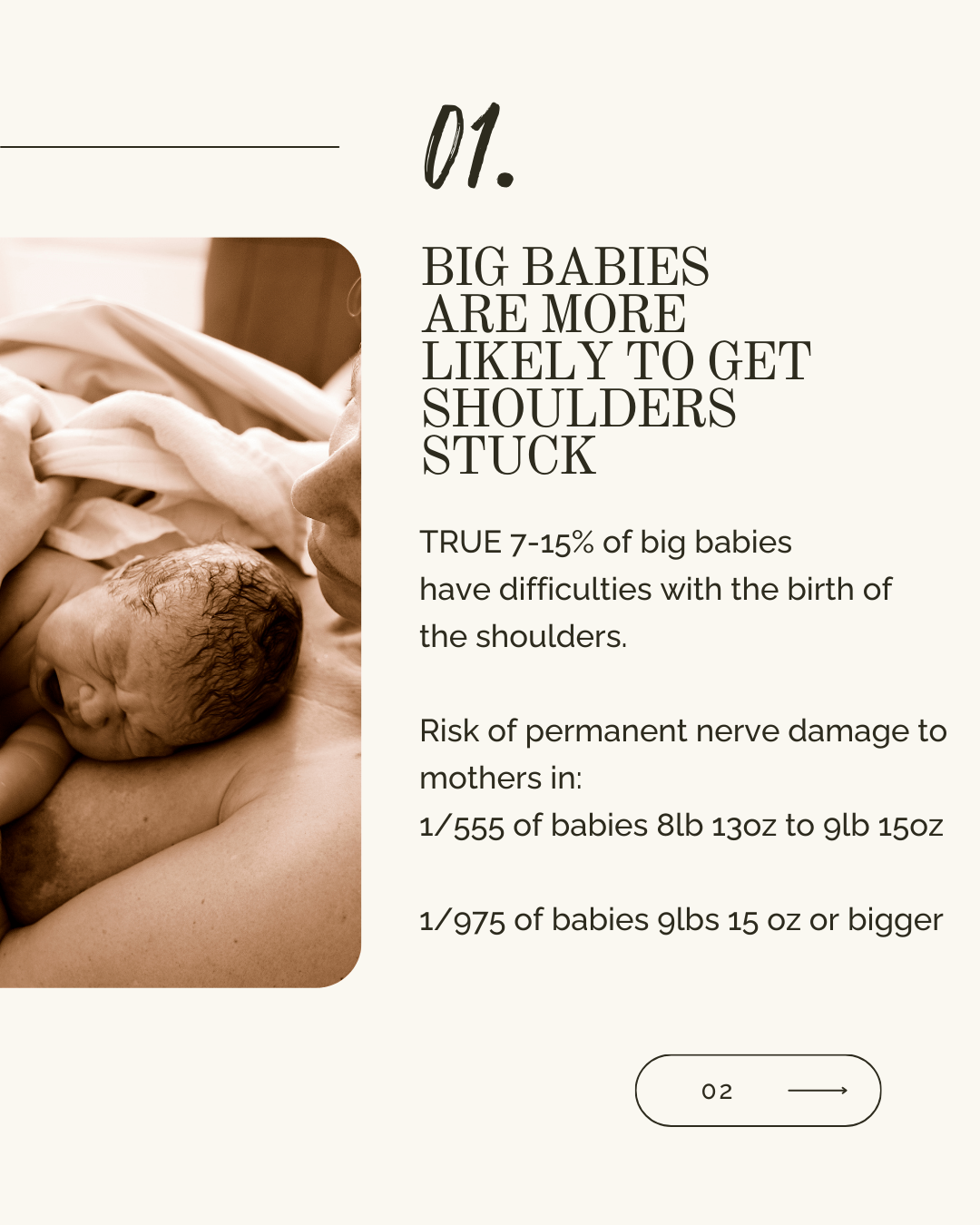
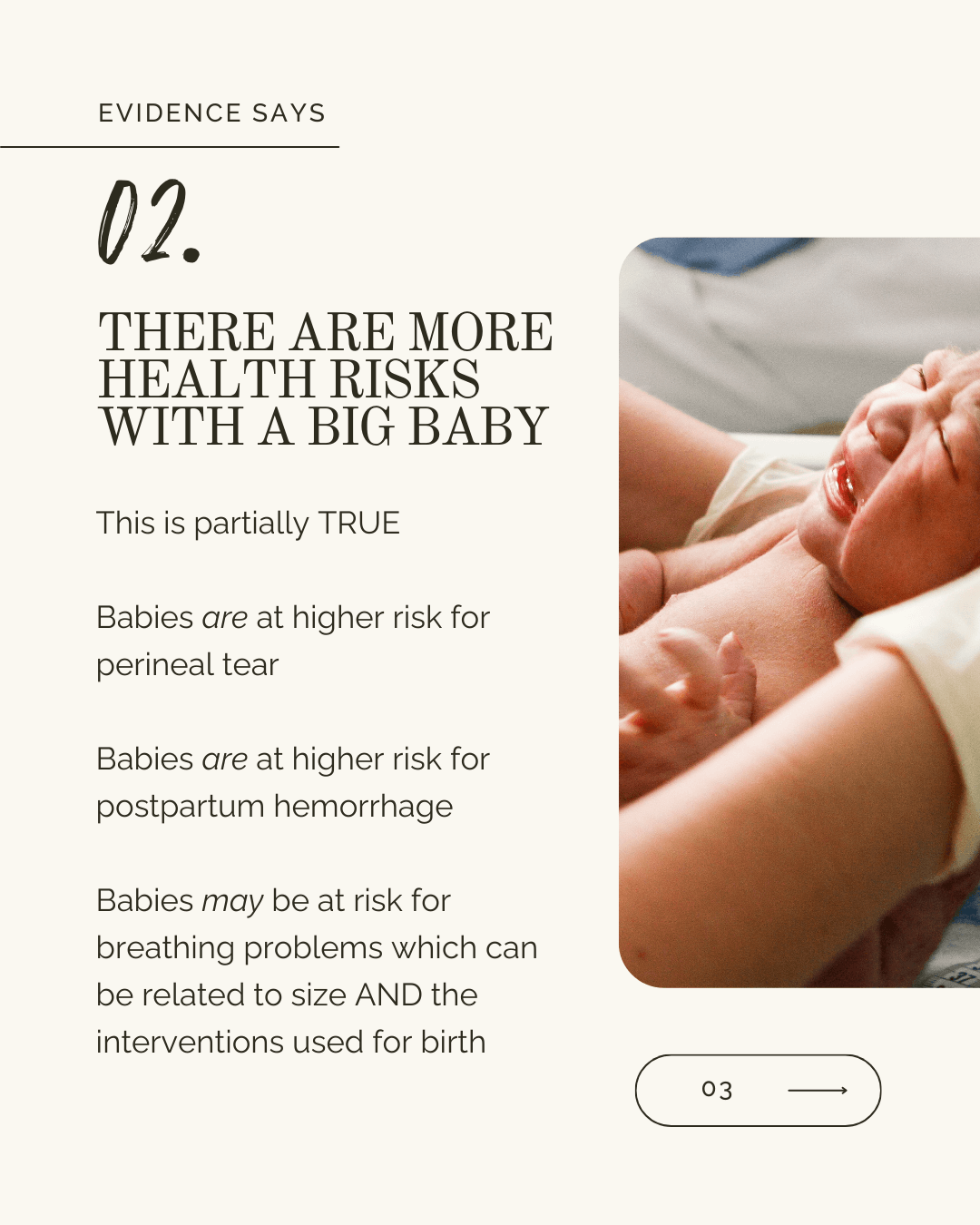
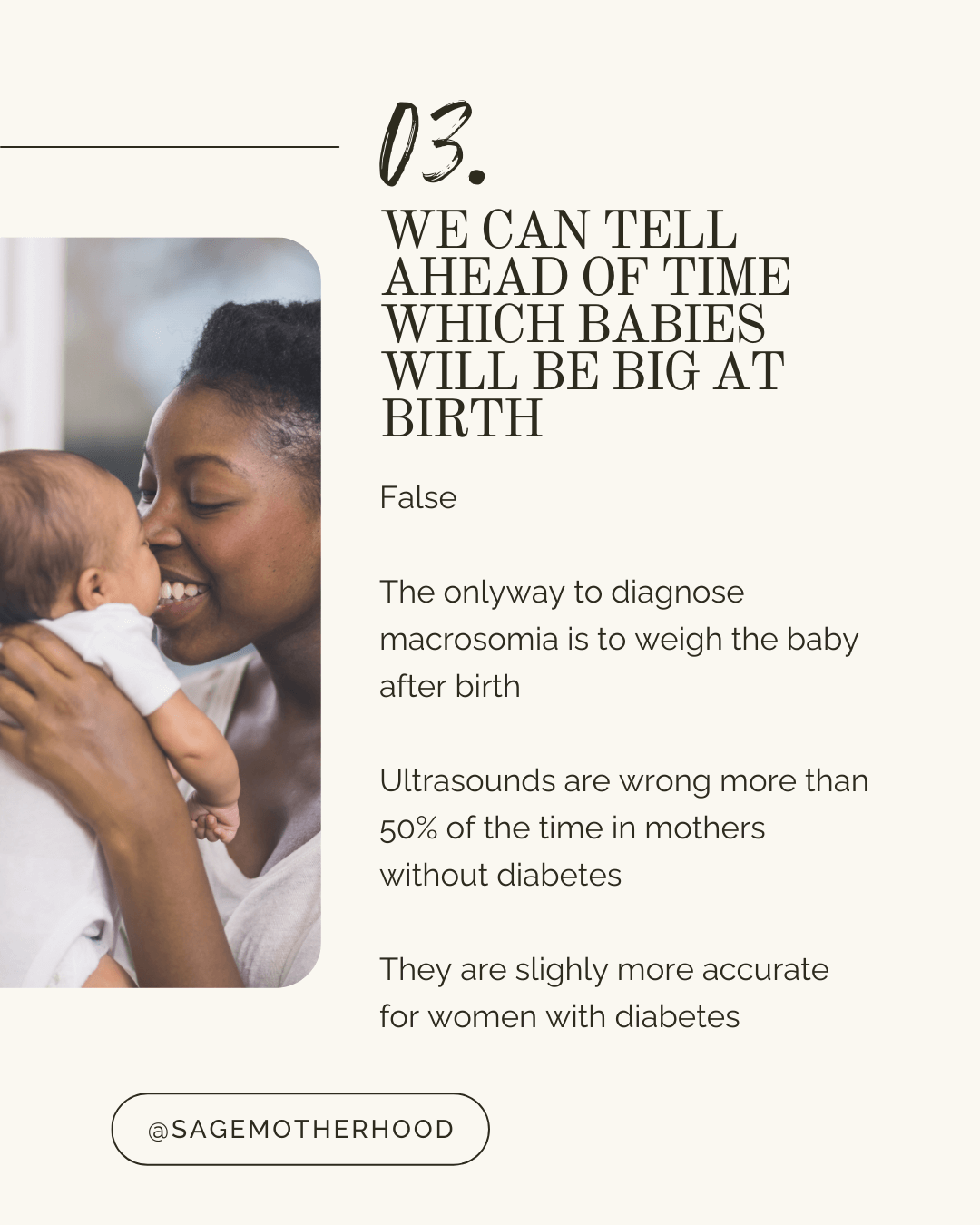
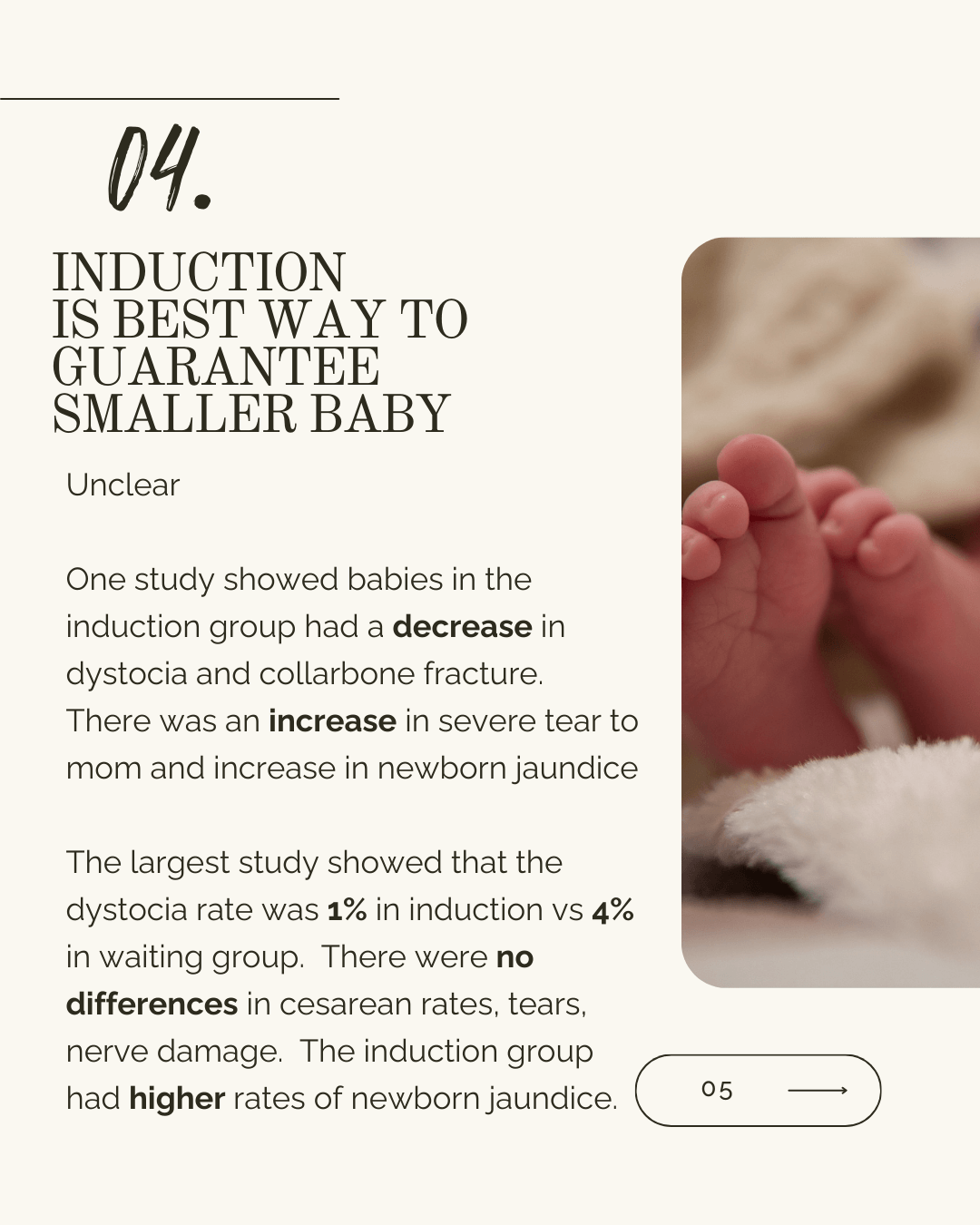
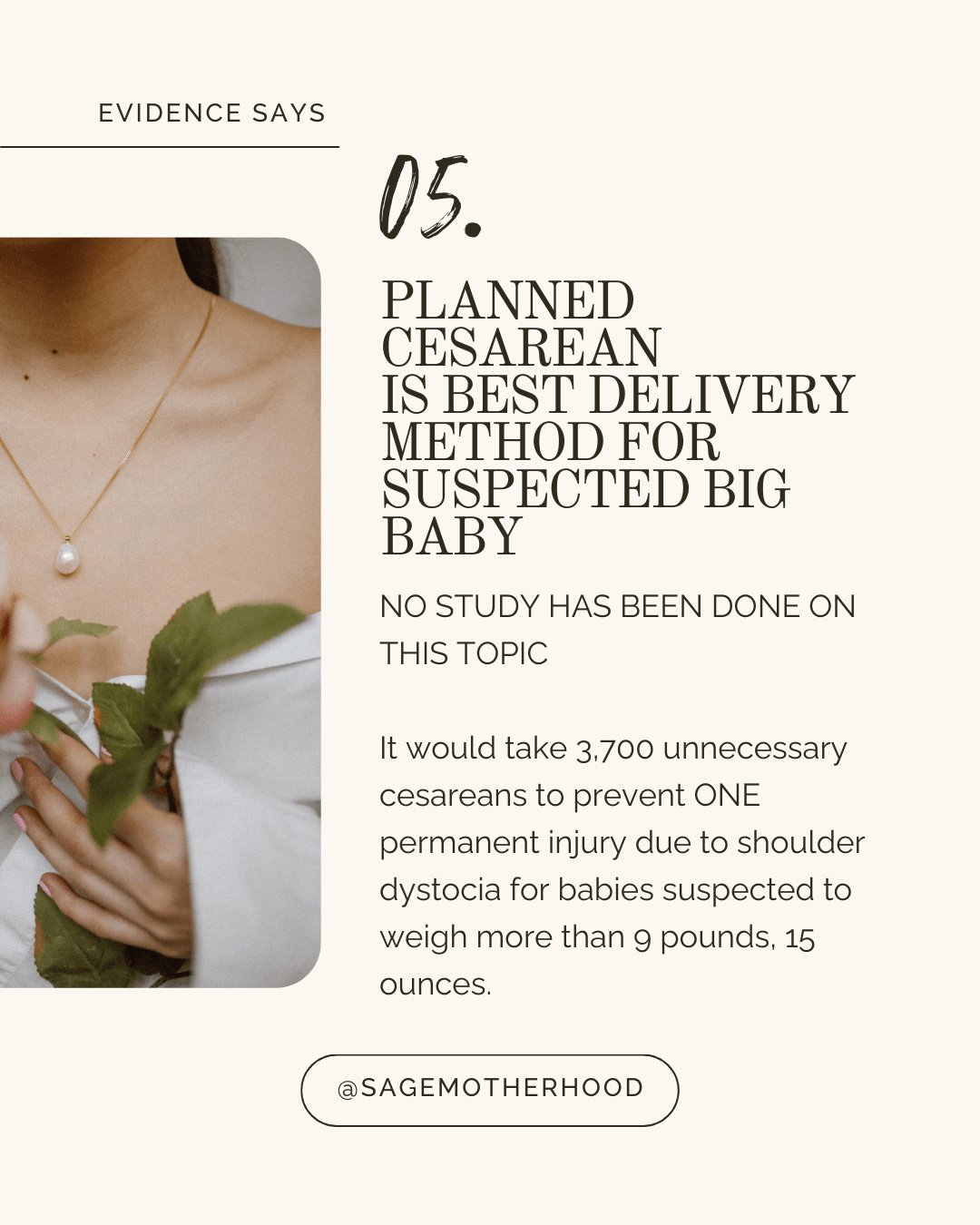
- 1/10 babies have macrosomia
- 1/3 mothers are told they have "suspected big babies" which is likely due to the overuse of inaccurate ultrasound measurements at the end of pregnancy.
- Mothers with diabetes have true risk factors for suspected big babies, and ultrasounds for this group due tend to have more accuracy.
- Shoulder dystocia happens about 1% of the time in birth and it's rarely able to be predicted. The incidence is higher when babies weigh more than 8lbs 13oz
- Induction may lower the risk of dystocia when performed at 37-38 weeks, but these babies have more incidences of newborn jaundice and severe tears for mother.
- There is no clear data on when induction is indicated for shoulder dystocia
- Newborn jaundice, respiratory problems are common risk to baby when labor is induced due to suspected macrosomia.
Consider this:
Disclaimer, this is not medical advice. Your choices are your own and remember you have the right to understand the risks, benefits, alternatives and reasoning to any intervention offered in your pregnancy or birth. It is your job to ask questions and make the decision aligned with your values and goals.
Women who are suspected of having a big baby are much more likely to be offered inductions that women who are otherwise having a healthy pregnancy. The gap between suspected and actual macrosomia is incredibly unreliable for women without diabetes. Mothers with suspected big baby may also experience additional pressure to progress during labor or pushing phase that can lead to non-indicated interventions. Unfortunately, staff impatience can be a factor in your birth.
Having a digital doula is the best way to set yourself up for an enjoyable pregnancy, empowered birth, restful postpartum and satisfying newborn phase. I can help you make decisions that reduce your risks and improve your outcomes by applying the evidence and awakening your mama intuition.
You can have access to my experience, training and passion for pregnancy, birth, postpartum and all things baby in Sage Mama Maternity. To get started, book your free 30 minute consultation now.
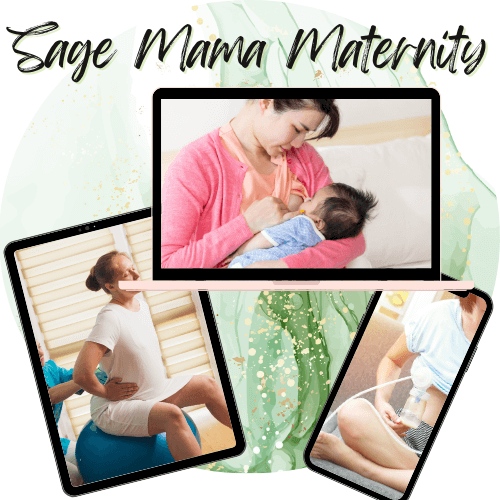 You're probably so excited about welcoming your baby into your home, if you're like most moms you're probably flipping through a few books, you've download some apps, and listening to your friend's and family's experience. You're probably doing your part to be a star patient for your doctor or midwife.
You're probably so excited about welcoming your baby into your home, if you're like most moms you're probably flipping through a few books, you've download some apps, and listening to your friend's and family's experience. You're probably doing your part to be a star patient for your doctor or midwife.I totally get that, and this is actually a problem because you're going to get you varied, sometimes conflicting advice that might not even work for your circumstance, and here is the kicker: lots of time's it not evidence-based guidance.
Instead of that, I want to offer you that working with a doula from your first trimester through your postpartum time is actually going to give you what you really need: cohesive information, expert guidance and the emotional support that every new mom deserves. It's like having an a doula in your pocket (or purse if that's where you keep your phone)
Hiring a Digital Doula is the best way to have a positive experience during your pregnancy, birth and postpartum. I would love to be your digital doula.
Prenatal vitamins are a safeguard for places where your diet is insufficient. Vitamin C is a very powerrful piece of health for you in pregnancy and for baby's development and health. Learn more in this post how to get enough Vitamin C and what it does for you and baby.




